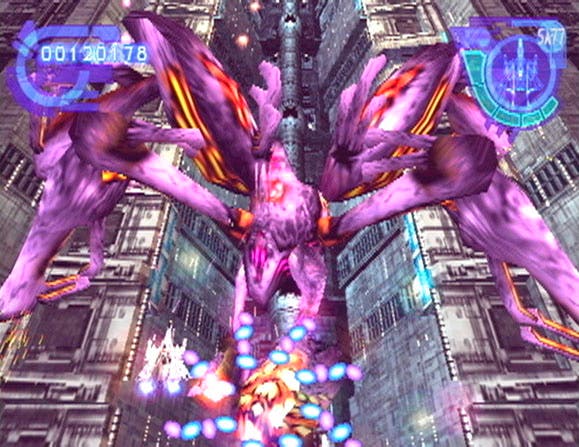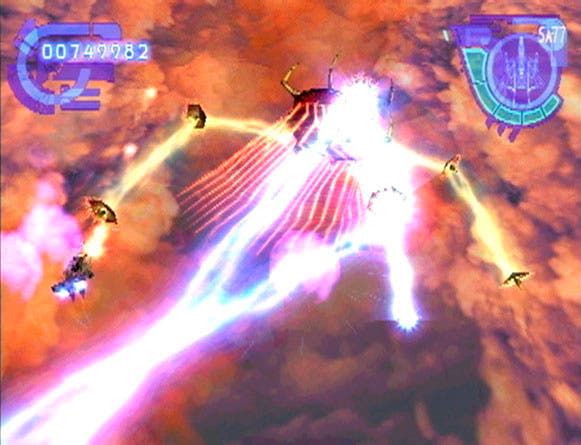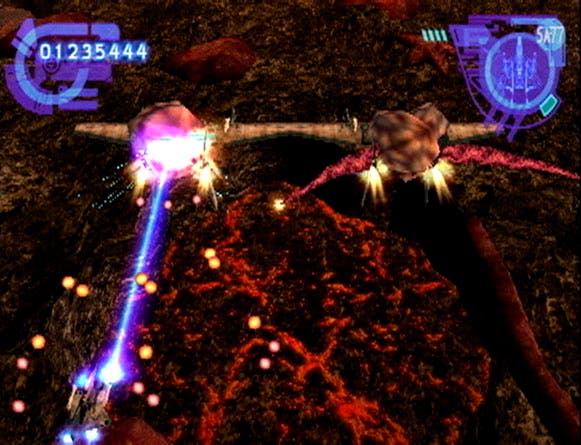Silpheed: The Lost Planet
Review - Mugwum investigates Game Arts latest foray into the shoot 'em up market, this time on PlayStation 2

Subtle
The PlayStation 2 runs the risk of playing home to too many "gimmick" titles. Games that are more gloss than substance and only serve to show off the graphical capabilities of the console. Like Fantavision, although admittedly that does offer some traces of entertainment. Thankfully Silpheed is not only good looking, but also enjoyable, and with a degree of replayability that can be harnessed to extend the life of the game further than one would expect of a 2D shooter. More than a trip down memory lane or a gimmick shooter, it's an example of how innovation has grown within the confines of the genre. Once you get past the fact that Silpheed sounds like some sort of sexually transmitted disease, it's actually a surprisingly good 2D shoot 'em up. It's been put together quite quickly, but that doesn't seem to hurt it any; if anything it does a better job than Gigawing, last year's flash in the pan Dreamcast shoot 'em up success. The basic concept, as if you hadn't figured it out, is to progress up the screen shooting the bad guys. They tend to originate at the top, whereas you start life on the bottom. Unlike Space Invaders though, Silpheed does it with a bit of sparkle. You're always heading up, but up isn't always up, if you see what I mean. The last game I recall that did this properly was Silvergun. The level design is pretty exciting in this respect, although a little nauseating at times, particularly on a big-screen TV.

Tricky
The bosses and general enemies are a bit humdrum and unexciting for their part, although there are a couple that are worth persevering to see. You'll need some mad skills to get to them though, let alone past them, even though a number of them seem to behave like seven-year-old cricket batsmen protecting the stumps from a mile out. Difficulty on the whole is just the wrong side of easy. There is no "Easy" option, just Normal and Hard, although that's more psychological than anything. Personally I'd have called them Normal and Fiendish, though. The number of Continues is pretty much unlimited, although it's back to the beginning of the level with you in the event that you come a cropper. The end sequence of the game is fairly unadventurous, and you do complete it relatively quickly thanks to the continues, but there's a lot more to the game than simply repeating the same sections until you know them off by heart. You actually learn the patterns of certain enemies and how to react as they enter your field of vision. Your general skill level increases with each level, and this helps you achieve a higher score. The scoring system gives you more credit for kills the closer you are to the victim, multiplying your score by a certain factor depending on proximity. You run the risk of getting killed more quickly, but there is an element of one-more-go-ism there, certainly enough to enhance the replay value of the game.

Conclusions
Many people think "2D" and imagine Mario, or Sonic, or another game where the sprites are basically painted onto a brightly coloured background and the camera scrolls along in Mode 7 or similar. Silpheed's backgrounds aren't just bright, they're lively, and the camera doesn't just pan along, it sweeps by the action, catching the heaving lava flow and rolling layered fog as your little ship cruises by. The explosions are rendered beautifully, although the carnage does slow down the PlayStation 2 on a couple of occasions. The gameplay is punctuated by cinematics, lifted directly from the Japanese version, which far from amusing, demonstrate Game Arts' superb ability to speak English! Correct grammatical pronunciation may not be quite as common as South American drawl in action titles, but it's surprisingly effective when yelled across the tactical voice network and in general story-telling. The cinematics weren't done in-house according to the manual, but no mention is given to the authors. Complementing the cinematics and the gameplay is quite an excellent orchestral soundtrack. Gigawing's sequel threatens us with an entirely original score and orchestral overtones, but it looks like Silpheed beat it to the punch. Visually, aurally, and in terms of gameplay, Silpheed is an exemplary 2D shoot 'em up, and it does its best to disguise that fact, too. There are still things that could have done with work - the slowdown is particularly annoying when it occurs - but generally speaking it's an excellent, by the numbers shooter, and superb entertainment, without a gimmick in sight.

